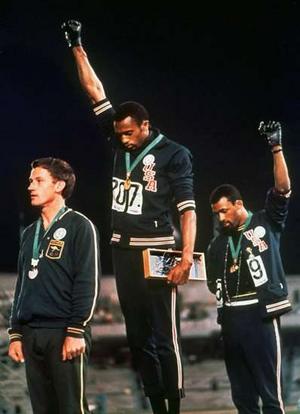 |
| U.S. athletes Tommie Smith (centre) and John Carlos (right) extend gloved hands skyward in racial protest at the 1968 Olympics. |
Ask most athletes and they’ll tell you the Olympic Games are no place for politics. Rather, the games are all about “sport and true competition,” as kayaker Karen Furneaux (BSc 2000, MSc 2005) puts it.
“I’m an athlete. I’m not a politician,” responds gymnast David Kikuchi (BSc 2001) when asked about talk of boycotting the Beijing Olympics.
And yet, athletes have made some very creative and effective political statements at the Olympics over the years. “Athletes are so single-minded and focused that it’s not fair to expect them to become sophisticated political actors,” says David Black, professor of political science at ���ϳԹ���. “But nonetheless, some of them will be.”
Here’s a look at some of the Olympics’ most eloquent political statements:
- On the verge of the Second World War, Berlin was bristling with Nazism and red-and-black swastikas were flying everywhere. With the Olympics coming in the summer of 1936, Adolf Hitler viewed it as a golden opportunity to showcase the superiority of his glorious Aryan race. It was 22-year-old African-American Jesse Owens who was able to put the brakes on that plan by winning four gold medals in track-and-field—in the 100- and 200-metre dash, the broad jump and the 4x100-metre relay.
- At the Mexico City Games in 1968, two black American sprinters stood on the medal podium with heads bowed and fists raised—a symbol of black power. Teammates Tommie Smith and John Carlos had secretly planned a non-violent protest to bring attention to the injustices faced by black Americans should they medal in the 200-metre race. Which they did, with Smith capturing gold and Carlos bronze. The gesture—they also wore no shoes to reflect the poverty of black people—is widely regarded as a courageous image of impassioned dissent. But at the time, the athletes encountered such outrage that they were stripped of their medals, suspended from their national team and banned from the Olympic village. The athletes and their families also received many death threats.
- At the Sydney Games in 2000, aboriginal athlete Cathy Freeman lit the Olympic flame and won the gold medal for her event, the 400-metre race, on her home turf. The lighting of the flame and her victory were of huge symbolic significance to a nation still wrestling with the legacy of its maltreatment of its indigenous peoples. Deeply proud of her heritage, she made a point of carrying not just the Australian flag but the aboriginal one as well on her lap of honour.
